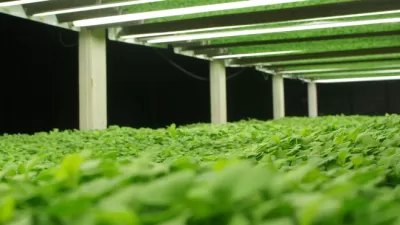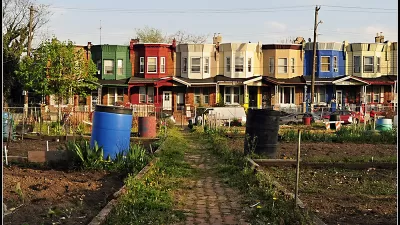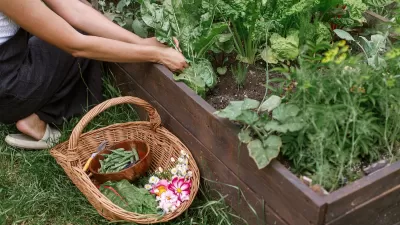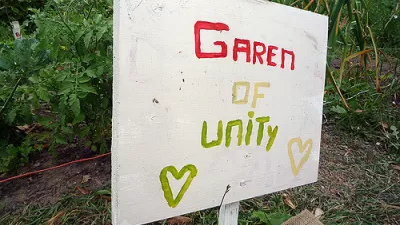Urban agriculture likely has more social than material impacts. But who does it benefit most?

With the continued popularity of urban agriculture and community garden programs, Vox sets out to determine their true value. Specifically, writer Brad Plumer asks, "Are there real social or environmental benefits to growing food within city limits? Or is urban farming just a well-meaning but ultimately insignificant hobby for urban elites?"
Plumer explores a May study from the Johns Hopkins Center for a Livable Future that found, in so many words, that "the actual food grown in community gardens and urban farms nowadays is their least important contribution."
Undeniably, many people in American cities cannot easily access healthy or fresh food. But today, that’s a failure of distribution, rather than of production. "We're not suffering from a dearth of cropland," Plumer writes.
Rather, in some cities, urban agriculture has been found to increase social bonds and provide a forum for science education, civic engagement, youth development, and workforce training.
Still, even these social impacts can cut both ways, depending on how, where, and by whom the programs are administered. "Urban farms aren't always as inclusive as they aspire to be—and there are often huge class divides," Plumer writes.
A number of case studies have found that urban farms and gardens — both for-profit and non-profit — have been led by mostly white non-residents in predominantly black and/or Latino neighborhoods, unintentionally excluding people of color from participating in or reaping the benefit of such efforts.
Moreover, Plumer adds that "when a community garden is established in a neighborhood, property values typically shoot up in the surrounding area. This can also raise thorny issues around gentrification and displacement in low-income areas."
And the study found that when urban ag initiatives are led by low-income communities and communities of color, they are often stymied from realizing their full potential by "disparities in access to land, government funding, and political support compared to urban agriculture efforts led by white and middle-class groups."
FULL STORY: The real value of urban farming. (Hint: It's not always the food.)

Planetizen Federal Action Tracker
A weekly monitor of how Trump’s orders and actions are impacting planners and planning in America.

Map: Where Senate Republicans Want to Sell Your Public Lands
For public land advocates, the Senate Republicans’ proposal to sell millions of acres of public land in the West is “the biggest fight of their careers.”

Restaurant Patios Were a Pandemic Win — Why Were They so Hard to Keep?
Social distancing requirements and changes in travel patterns prompted cities to pilot new uses for street and sidewalk space. Then it got complicated.

California Homeless Arrests, Citations Spike After Ruling
An investigation reveals that anti-homeless actions increased up to 500% after Grants Pass v. Johnson — even in cities claiming no policy change.

Albuquerque Route 66 Motels Become Affordable Housing
A $4 million city fund is incentivizing developers to breathe new life into derelict midcentury motels.

DC Area County Eliminates Bus Fares
Montgomery County joins a growing trend of making transit free.
Urban Design for Planners 1: Software Tools
This six-course series explores essential urban design concepts using open source software and equips planners with the tools they need to participate fully in the urban design process.
Planning for Universal Design
Learn the tools for implementing Universal Design in planning regulations.
Heyer Gruel & Associates PA
JM Goldson LLC
Custer County Colorado
City of Camden Redevelopment Agency
City of Astoria
Transportation Research & Education Center (TREC) at Portland State University
Camden Redevelopment Agency
City of Claremont
Municipality of Princeton (NJ)





























